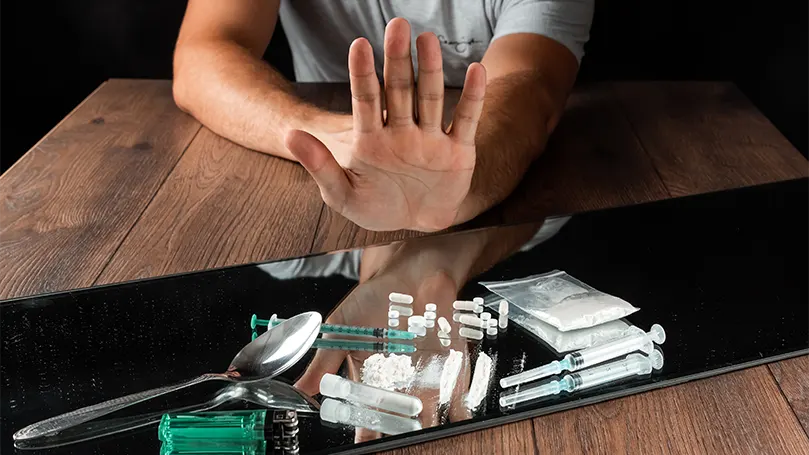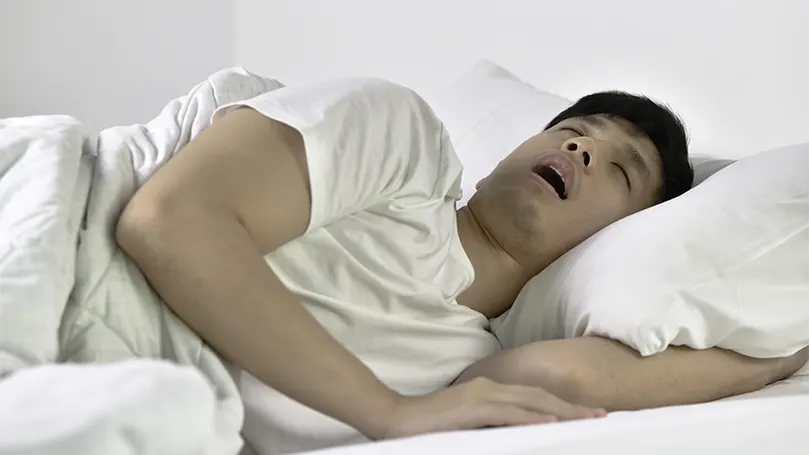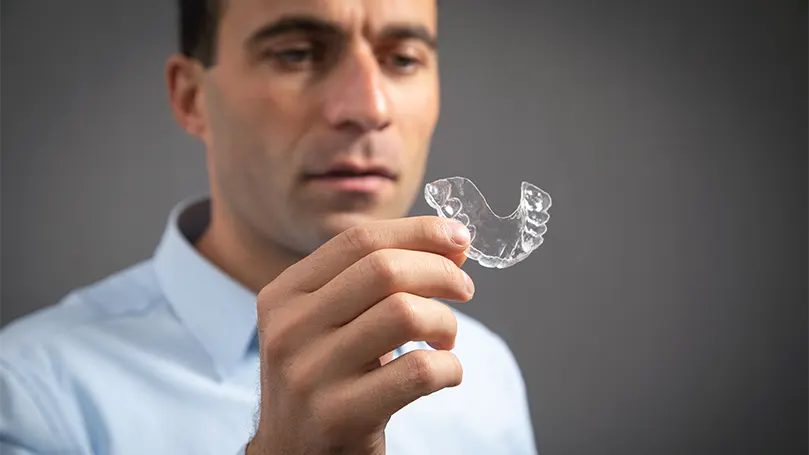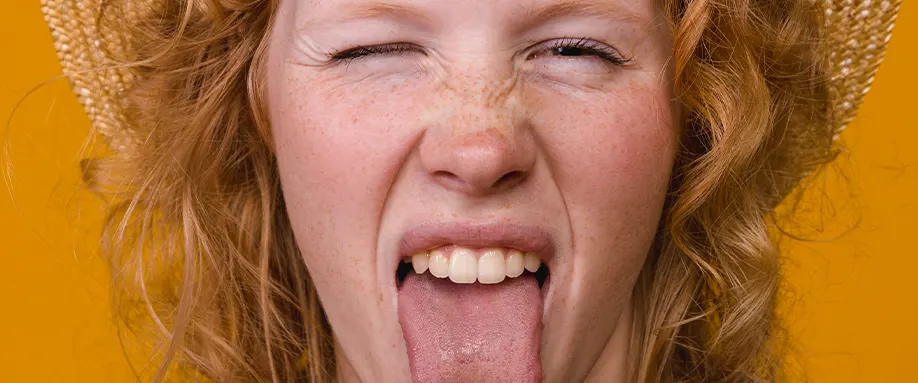Why does biting tongue in sleep happen in the first place?
So, why does the nocturnal tongue biting happen in the first place? Well, there can be a few reasons. Since we're mainly unconscious when we sleep, our brain doesn't always give the correct signals to our muscles. So, what usually happens is that the tongue gets trapped between the upper and lower teeth due to incorrect positioning and then gets bitten. But, as you know, it's never as simple as – it happens. Sure it does. But why do I have bruise on tongue? That's what we're trying to find out.

What are the main causes of biting the tongue in sleep?
There are several leading causes for biting your tongue as you sleep. And, not to scare you or anything, but most of them have something to do with an underlying condition or some lifestyle habits. Also, you will hear often: Why does my tongue hurt on the side? ?There could be a few reasons. Let's check them out!
Bruxism
Bruxism, otherwise known as teeth grinding, is one of the most common reasons people bite their tongues at night. And, unfortunately, that's not all that happens.
If you're not familiar, sleep bruxism is a condition that describes the clenching and grinding of teeth. And, in some extreme cases, it can even lead to the fracturing, chipping and breaking of teeth.
But, even if your case isn't that severe, it can still cause a lot of jaw pain and discomfort. And, on top of that, it can also lead to the development of other conditions, but we'll save that conversation for another time.

Facial muscle spasms
The condition, faciomandibular myoclonus, more commonly (and less frighteningly) known as facial muscle spasms is a condition that most commonly affects children and causes them to bit their tongue during the night.
Facial muscle spasms are involuntary muscle contractions that can be caused by various things, and they manifest as uncontrollable chin trembling, lip quivering, and – you guessed it – tongue biting.
Drug/substance abuse
Some drugs, like MDMA, can cause involuntary muscle spasms and teeth grinding which could lead to tongue biting. Why this happens is not completely clear, but according to one study, it's most likely due to the fact that these substances interfere with oral reflexes and jaw muscles, as well as increase our desire to bite or chew.

Lyme diseases
While Lyme disease still isn't fully understood, what we do know is that it affects pretty much every system in our body – including the nervous system.
And, since the nervous system is responsible for transmitting signals from the brain to the muscles, it's not surprising that one of the symptoms of Lyme disease is involuntary muscle contractions, aka muscle spasms, which can lead to tongue and cheek biting.
Seizures
As you can imagine, nighttime seizures (whether they're caused by epilepsy or not) can cause all sorts of involuntary muscle contractions – including tongue biting.
During a seizure, our brain's electrical activity becomes abnormal which leads to the muscles contracting and relaxing uncontrollably. And, in some cases, this can even lead to loss of consciousness. and an array of other complications including irreversible brain damage.
Rhythmic movement disorder
Although not common, rhythmic movement disorder (RMD) is a condition that can lead to tongue biting. This disorder is characterized by involuntary, repetitive movements of the head (head banging), neck, and limbs – usually during the early stages of sleep.
These movements are often accompanied by sounds like grunting, groaning, or moaning. And, in some cases, they can even lead to sleepwalking.
Sleep apnea
Sleep apnea is a sleep disorder that's characterized by pauses in breathing or shallow breaths while sleeping. And, while sleep apnea itself isn't a cause for nighttime tongue biting, it is very common for people with sleep apnea to bite down on their tongues during the night.

The reasoning behind this is that people with sleep apnea usually have enlarged tongues or their mouth and jaw muscles relax a bit too much during the night.
What are the main symptoms of biting the tongue in sleep?
Now that we're familiar with the leading potential causes of late-night tongue biting – it's time we move on.
As you can imagine, unless this issue is severe, you might not even notice until you've injured yourself somewhat severely. On that note, we'll outline both very and less noticeable symptoms, so you can easily identify if you do nibble on your tongue while you rest.
Redness & swelling
Considering your tongue is pretty reddish and pink, redness may not be too easy to spot. However, if you regularly scrape or brush your tongue, you should be able to notice a change in colour.
On a second note, a swollen tongue should be pretty noticeable, especially if you've bitten your tongue hard enough. Not only will you feel the swelling, but you'll probably be able to see it, as well.
Pain
This one's pretty straightforward and rather noticeable – pain. If you regularly bite your tongue at night, you'll most likely feel a stinging or throbbing sensation in your mouth when you wake up in the morning.
Blisters & ulcers
Another common symptom of nighttime tongue biting is blisters and ulcers. While blisters are usually small and not too painful, ulcers can be pretty big and quite painful, making it hard for you to eat or drink, so it will be very hard to miss them.
Cuts & bruises on the tongue
Depending on how much you bite your tongue at night, you may also experience cuts and bruises. These tongue injuries usually heal on their own and don't require any medical attention, but if you do notice them, you'll probably want to stick around for the next section of our article, because cuts and bruises indicate a fairly severe case of nighttime tongue biting.
Bleeding tongue
Finally, if you notice your tongue is bleeding, that's a pretty clear indicator that you're biting your tongue at night. At this point, you'll want to consult with your doctor or a sleep specialist to discuss the treatment options.
How to stop biting your tongue in sleep?
Whether it's just a mild tongue pain, cuts, tongue bleeding, redness, or any of the aforementioned symptoms that you experience – you don't want to sweep them under the rug.
If you're regularly biting your tongue at night – it's time to do something about it to stop, before the situation escalates and you cause more damage to your tongue. So, how to stop biting lip as well?
Here are a few methods you can use to prevent biting your tongue in sleep:]
Use mouth guards
To stop biting tongue, your first line of defence from your sharp teeth should be a mouth guard. Bruised tongue will become a thing in the past. You can either buy one over the counter or get a custom-made mouthguard from your dentist.

Custom-made mouthguards will fit your teeth perfectly and will be more comfortable to wear, but they're also a bit more expensive. On the other hand, over-the-counter mouthguards are a bit cheaper, but they will offer pretty much the same level of protection.
These will also help with teeth grinding.
Reduce stress
You've probably heard this one a thousand times, but reducing stress can do wonders for your overall health, including the quality of your sleep. So, if you can – keep the stress to a minimum.
There are many ways you can reduce stress and prevent tongue biting, but some of the most effective ones include:
- Exercise regularly
- Get enough sleep
- Eat a healthy diet
- Do relaxation exercises
- Talk to a therapist
- Use natural remedies
And many, many more… Including some sweet ones!
Stop abusing drugs
As we've said, some drugs like MDMA can cause teeth grinding and tongue biting. So, if you're an occasional or recreational user, you may want to consider quitting. Not only will this help your tongue, but will do wonders for your overall health as well.
Take antiseizure medications
If your tongue-biting is caused by epilepsy or other seizure-inducing condition, your doctor will likely prescribe you antiseizure medications.
These will help keep your seizures in check and, as an added bonus – will help you quit biting your tongue at night, although we're very much certain that a few bites aren't your biggest concern in this case.
When to see a doctor for biting tongue in sleep?
While we can't say you shouldn't pay your doctor a visit if you experience minor discomfort, there are certain cases when you should definitely go see a doctor or a sleep specialist to discuss your condition. These include:
- Severe cuts and bruises
- Excruciating pain
- Excessive swelling
- Noticeable bleeding.

If you notice any of these, or you suspect an underlying condition is causing your tongue biting – make an appointment with your doctor as soon as possible.
Conclusion
To sum everything up, biting your tongue at night can be quite a nuisance. It can cause pain, swelling, cuts, and bruises. In some cases, it can even lead to bleeding. If you're experiencing any of these symptoms, and that's causing you distress – it's time to do something about it.
The good news is that there are many things you can do to stop biting your tongue at night, and we've outlined most of them here! Take care!















There are no comments yet
"*" indicates required fields